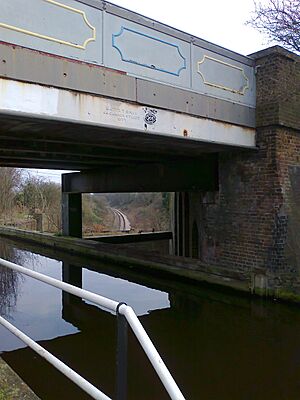Three Bridges, London facts for kids
Quick facts for kids Three Bridges |
|
|---|---|

View from the canal showing the road (upper level) and the crossing railway line
|
|
| Type | Bridges |
| Location | Southall |
| OS grid reference | TQ 14246 79655 |
| Area | London Borough of Ealing |
| Built | 1859 |
| Architect | Isambard Kingdom Brunel |
| Official name: Windmill Bridge | |
| Designated | 26 January 1970 |
| Reference no. | 1002020 |
| Lua error in Module:Location_map at line 420: attempt to index field 'wikibase' (a nil value). | |
The Three Bridges, also known as Windmill Bridge, is a special set of bridges in Southall, west London, England. It's unique because it lets three different paths cross each other at three different levels! This amazing project was the very last one finished by the famous engineer Isambard Kingdom Brunel before he passed away on September 15, 1859.
How the Three Bridges Work
A Clever Design
The Three Bridges were designed by the brilliant engineer Isambard Kingdom Brunel. He used two strong cast iron bridges to create this crossing. The main idea was to let three important routes pass over each other without getting in the way.
These routes are the Grand Junction Canal, the Great Western and Brentford Railway, and Windmill Lane (a road). Imagine a sandwich: the road is on top, the canal is in the middle, and the railway is at the bottom.
Why It Was Built This Way
The railway was the newest path added to this area. Brunel designed it so the railway tracks would be in a deep "cutting." A cutting is like a trench dug into the ground. This meant the railway wasn't visible from Osterley Park, a nearby historic estate. It also helped save money during construction.
Work on the Three Bridges started in 1856. It took about three years to build, and everything was finished in 1859.
A Protected Landmark
Today, the Three Bridges structure is a "scheduled monument." This means it's a very important historical site that is protected by law. It's right next to a park that has the same name, Windmill Park.
 | Aurelia Browder |
 | Nannie Helen Burroughs |
 | Michelle Alexander |

